MEN (2022)
A bereaved woman encounters a series of sinister men after renting a house in the English countryside.
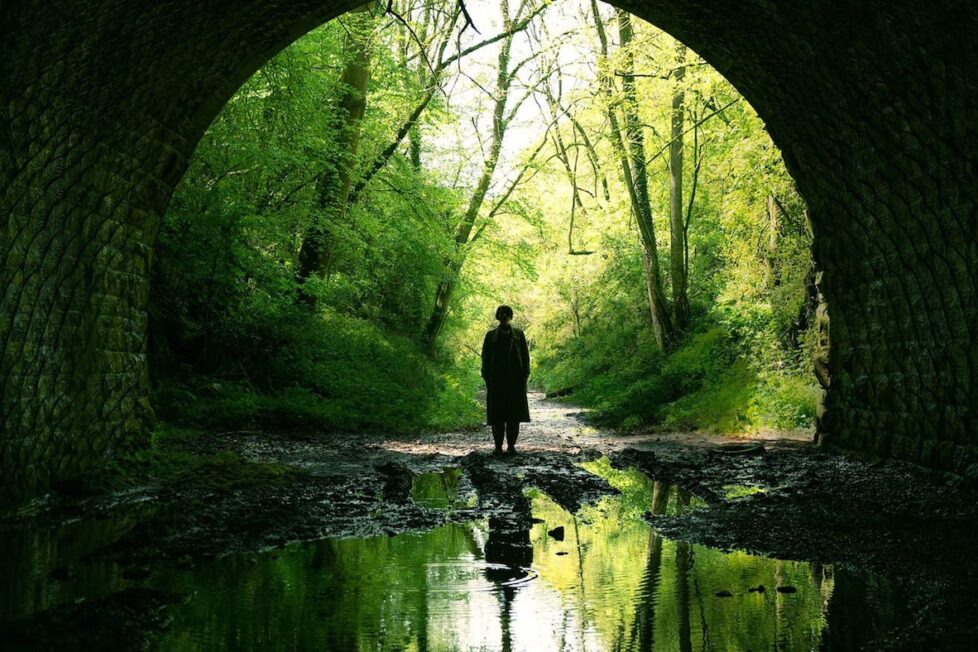
A bereaved woman encounters a series of sinister men after renting a house in the English countryside.


There are more men than women in Alex Garland’s Men—most being weird, authority figures, and apparently hostile to protagonist Harper (Jessie Buckley). Only two other women have any significance—a police officer (Sarah Twomey) and Harper’s friend Riley (Gayle Rankin), the latter seen mostly as a face on the phone. The women, in contrast, are friendly and at least try to be caring.
So it may look on the surface as if Men, Garland’s third feature as director after Ex Machina (2015) and Annihilation (2018), is a straightforward self-flagellation on behalf of all males. You can almost imagine the title being spoken with an exasperated tut: Men!!!
Things almost certainly aren’t that simple, however. Garland himself has raised the question of whether men are really so consistently awful, or whether Harper just sees it that way (at the same time as acknowledging that “I like setting up questions without necessarily forcing an answer”, in which respect Men much more resembles the atmospherically ambiguous Annihilation than the less mysterious Ex Machina). For example, while some of the male behaviour in Men is out-and-out obnoxious—such as the creepy vicar blaming Harper for provoking his sexual fantasies—several of the men may have simple and innocent enough needs for affection or recognition or engagement which are brusquely rejected by Harper.
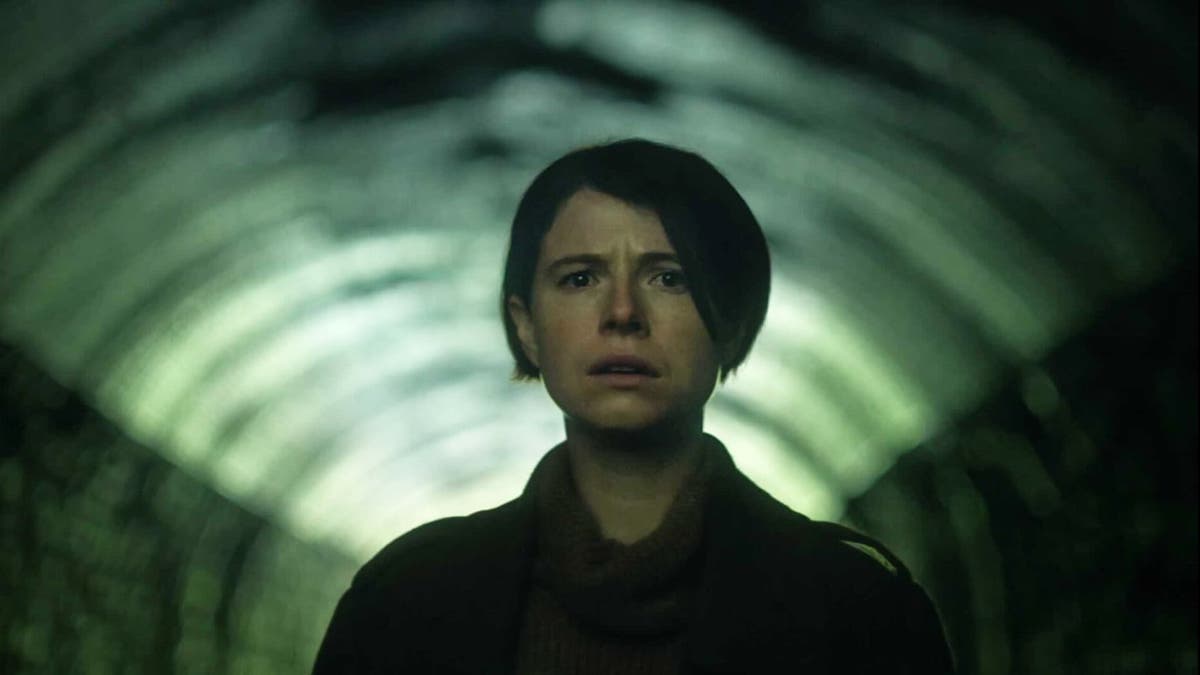
The last lines of the screenplay and Elton John’s “Love Song” at the end of the film (“Until you give your love / There’s nothing more that we can do”) seem to support the idea that this is a movie with #MenToo points to make as well as #MeToo ones, and that some of the responsibility for Harper’s prickly encounters lies with her.
Indeed, when we first encounter her, she’s a victim but not the only victim—standing in her London flat, her nose bloodied, staring out a window. Abruptly and shockingly, a man plummets past. This is her husband James (an affecting Paapa Essiedu); whether his fall is an accident or suicide remains uncertain, but his mental instability in his last hours is made clear by flashbacks including a ferociously raw argument about divorce. His physical violence toward her is undeniable, but is she right to so firmly deny that she also played a part in the events leading to his death? (We never know for sure; Men is more interested in her reaction than the facts of the matter.)
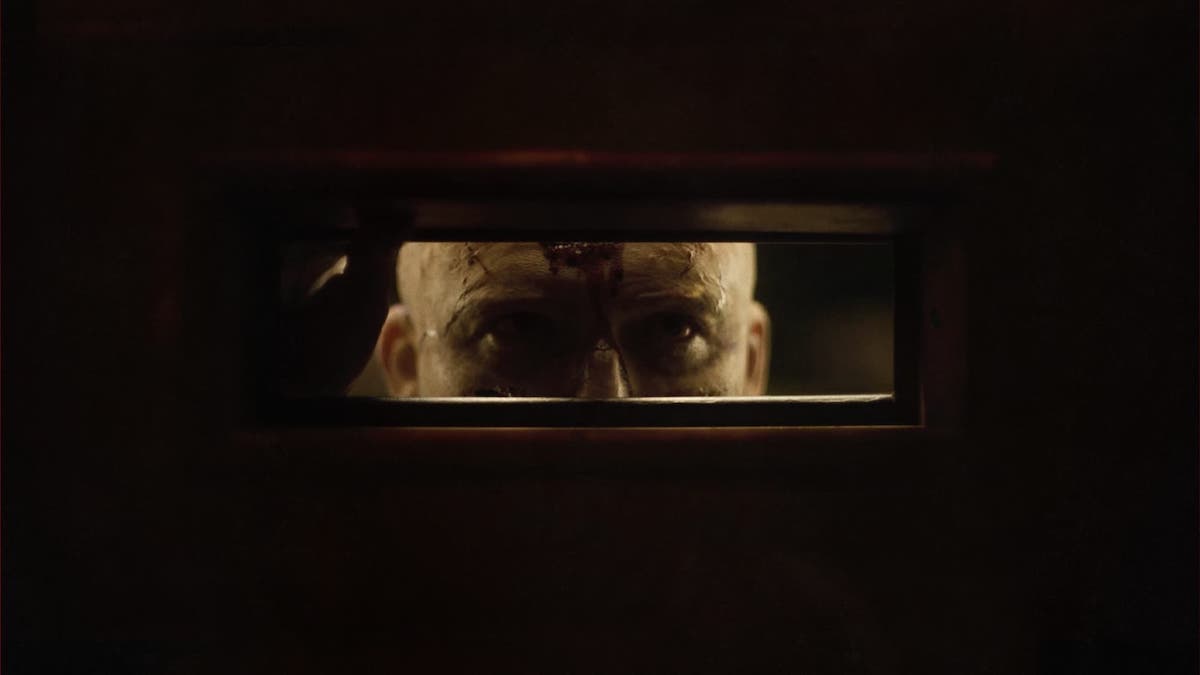
Emotionally fractured by this horrifying end to her marriage, Harper flees to the countryside, renting a large, secluded house in a small village for a couple of weeks. Here, the first male she meets is the owner, Geoffrey (Rory Kinnear), but others follow: a rude schoolboy in a blonde-bombshell mask, the aforementioned unsavoury vicar, and most unsettlingly a naked man who seems to be stalking her, initially appearing to Harper while she’s out on a walk, later showing up in her garden, staring. (All of these—in fact virtually all the male roles in the movie—are also played by Kinnear.)
The intensity, strangeness and nastiness of these encounters with men rapidly increase, and Harper seems alone; the police can’t do much to help her, nor can Geoffrey despite his seemingly good intentions, and Riley is back in London. By the end of the film, any pretence to plausibility has been abandoned and it culminates in a Cronenbergian extravaganza of male vaginas and impossible births which comes very, very close to being laughable.
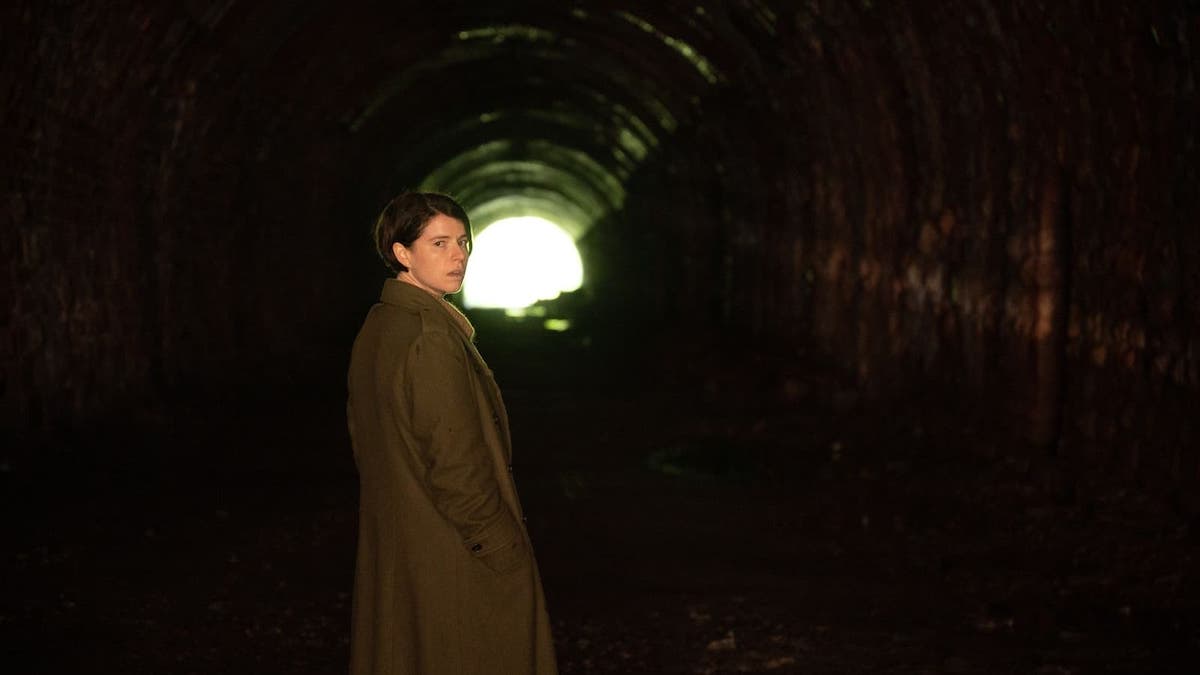
It doesn’t quite cross that line, though. In part because Garland, and importantly Kinnear too, have already made it clear the world surrounding Harper is going to be a fantastic and occasionally absurd one, even while her character is rendered entirely realistically. Geoffrey, for example, belongs in Royston Vasey with his hearty, awkward manner and his green wellies (“very country”, Harper tells Riley); the vicar could be Christopher Lee from The Wicker Man (1973) with a Hannibal Lecter sniff. Harper picking an apple from a tree near the beginning is blatantly symbolic, as is the ever-developing presence of the pagan Green Man figure, though—as with a great deal in Men—it’s not clear what they are symbolic of.
Kinnear’s said that “I wanted to make sure that all these characters seemed to emerge from the countryside, that they were just as much part of the natural world, as the deer and the leaves and the foliage and the tunnels. I wanted them to feel firmly rooted within this community and this natural landscape.” But surely Men isn’t just a kind of surreal English Deliverance (1972), in which an unsuspecting urbanite finds that rural life is far from the placid, sunny idyll they supposed. Garland (who, remember, is fond of unanswered questions) cannot be arguing that the countryside is really anything like this… because the point would be patently ridiculous. Men, indubitably a difficult film to read, must be about Harper’s perceptions as much as any objective reality.
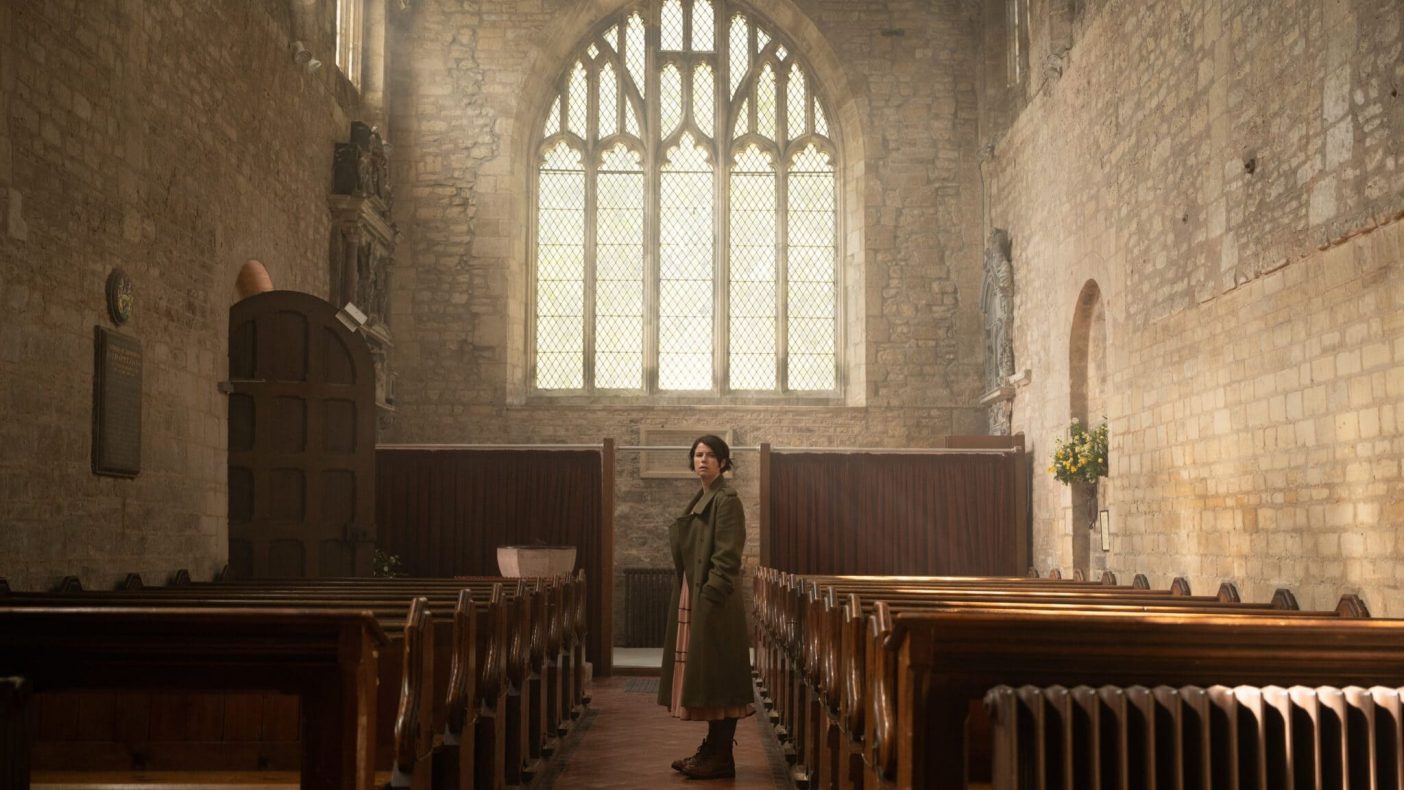
Perhaps the most interesting aspect of this (and one I haven’t seen any discussion of) comes with the question of where Harper actually is. At one point she says the house is in Hertfordshire, a little north of London, but when we see her driving there the road signs indicate she’s heading west; the M4 motorway, running that direction, is also mentioned, and the house itself visually belongs in the Cotswolds. Yet she also says it’s a four-hour drive from London—a lot longer than it would take to reach either Hertfordshire or the Cotswolds—and when she gives Riley the postcode, it begins with HL. In reality, there’s no HL postcode area in the UK, but if there were one for Hell, it might well use those letters… right?
These contradictions (as well as a few other cases where things change inexplicably) bring to mind Charlie Kaufman’s superb I’m Thinking of Ending Things (2020), also starring Buckley. The genesis of Garland’s Men long predates the Kaufman film, but it’s tempting to suspect that Garland, too, is dropping little hints that we shouldn’t take everything at face value. Men may not be a literal statement of what relations between men and women are actually like, any more than I’m Thinking of Ending Things was.
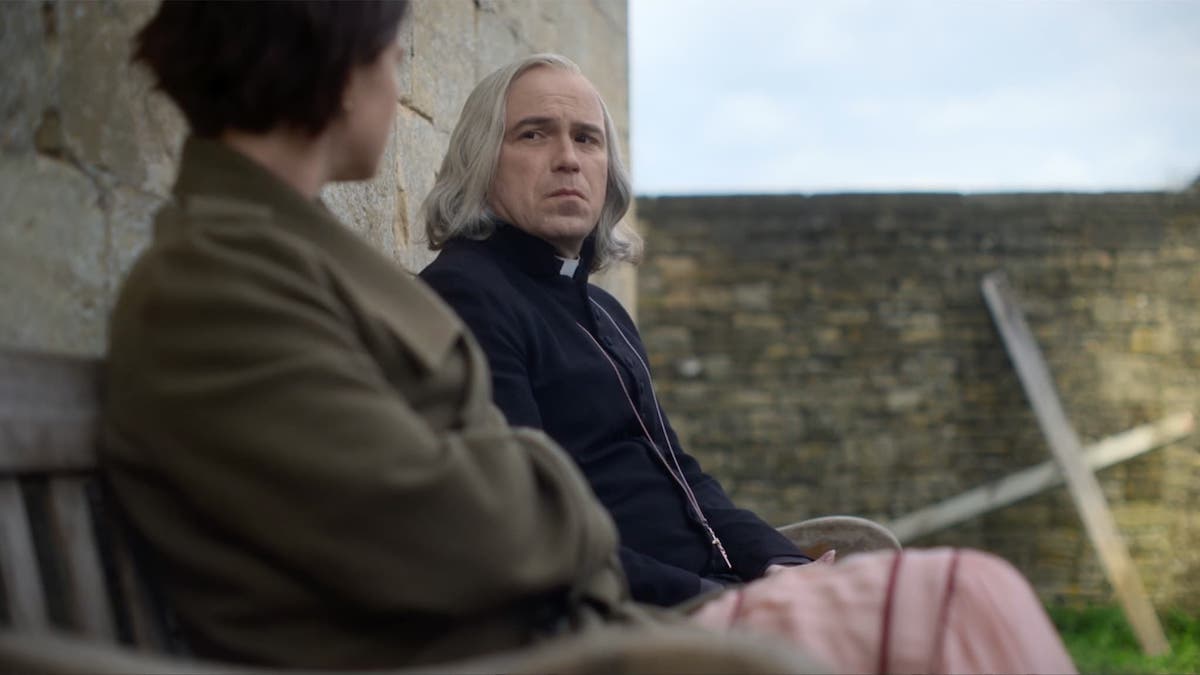
All this might suggest that Men is purely a film of ideas, but it’s a very sensory and sensuous one too, with cinematography (Rob Hardy) and music (Geoff Barrow of Portishead and Ben Salisbury) contributing nearly as much as the words and performances.
In the score by Barrow and Salisbury (who also wrote for Ex Machina and Annihilation as well as this year’s intriguing Netflix series Archive 81), electronically manipulated choral voices—usually such a tiresome cliché of the horror genre—for once work terrifically well. The range of textures and timbres they create is impressive: sometimes soothing, sometimes fragmented, writhing or howling, sometimes resembling other instruments more than voices, fusing with the echoes of Harper’s own voice when she calls out in a cavernous deserted tunnel, later merging with her despairing scream.
Hardy’s visuals, meanwhile, frequently recall Annihilation (as well as Ben Wheatley’s In the Earth) in their use of natural tones—yellows, greens, reds, browns—and the way the sheer greenness of the countryside becomes almost overwhelming. Leisurely editing and a camera that often seems immobile contribute to an impression that Harper might be trapped in a place outside of normal time and geography (in fact the camera does move quite a lot, but generally only subtly and in one plane at a time, without disturbing the effect of stasis).
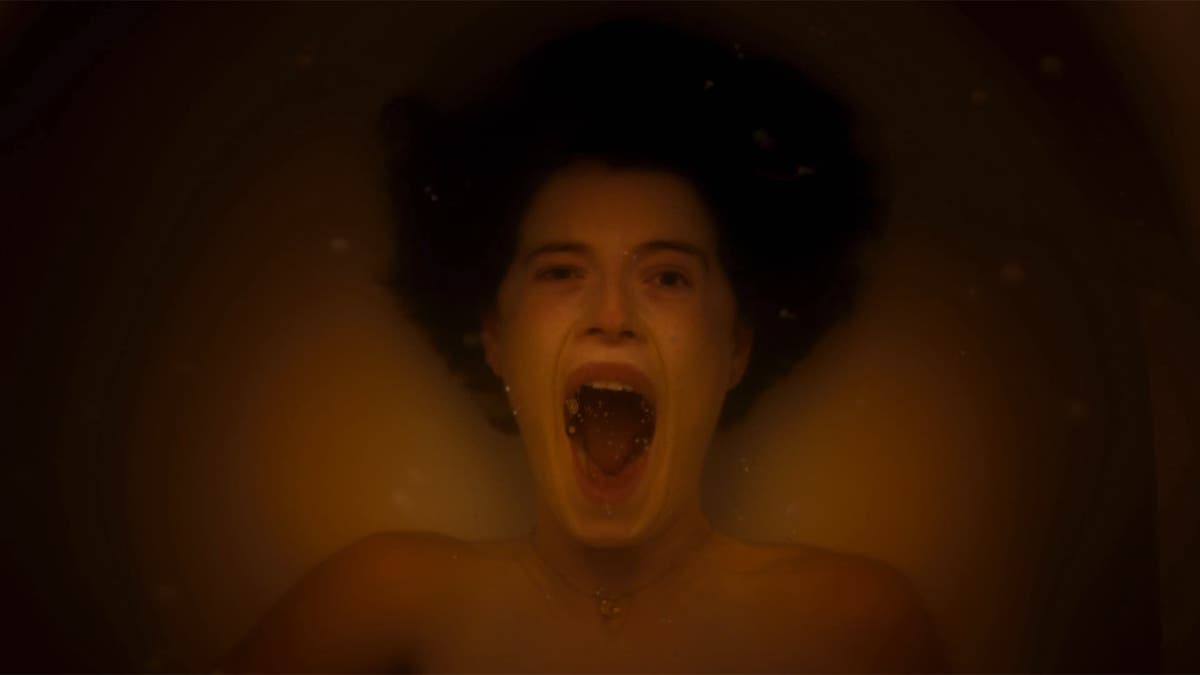
“I don’t know if I’m tormented, exactly,” Riley tells the vicar (when she first meets him, before his less pleasant traits are disclosed). “It feels more like…”
“Haunted?” he suggests, and this may be the closest that Men comes to an overt thematic statement. Harper clearly is haunted by what happened to her husband, and the violence of different kinds—involving a car, a knife, and a bird—that recurs is easily seen as her reliving the violence of his death.
The extent to which she’s haunted by other aspects of it is harder to be sure about, and this is what makes Men so infuriatingly but fascinatingly slippery. Perhaps she sees all men as (more or less) abusive and vile because that is what they really are? Or perhaps she does it to avoid facing up to her own guilt about James’s last minutes? Perhaps both perceptions would be equally self-destructive? “Love is the key we must turn,” sings Elton John. “Truth is the flame we must burn. Freedom the lesson we must learn.”
Garland’s movie nudges us toward all these questions. Its lack of clarity on them might be frustrating, and some of its strangenesses can be distracting, but they add up to a distinctive and original film that will leave audiences as haunted as its central character.
UK | 2022 | 100 MINUTES | 1.85:1 | COLOUR | ENGLISH


writer & director: Alex Garland.
starring: Jessie Buckley, Rory Kinnear & Paapa Essiedu.
